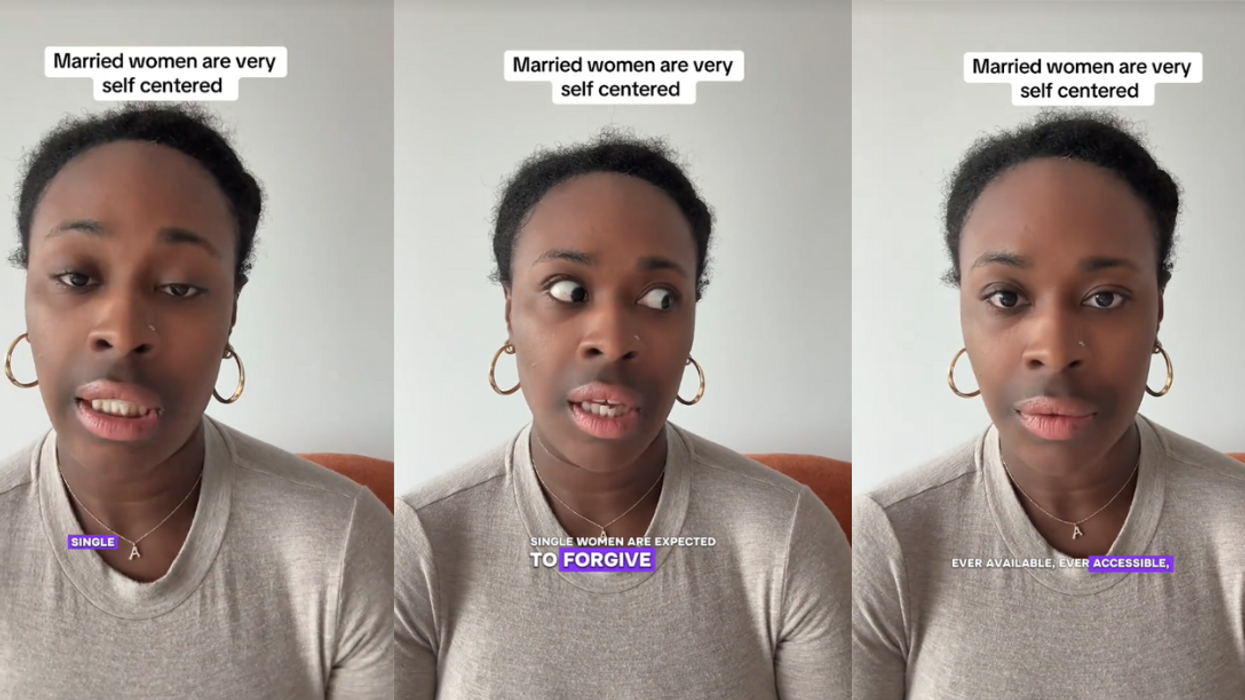When it comes to the language we hear, read, and speak every day, it can be easy for us to take advantage of all the interesting ways it's transformed since its beginning.
But when etymologists are given the opportunity to nerd out over their favorite facts, they're not shy about sharing.
So when Redditor ocddoc shared a fun question, the etymologists lurking on Reddit were quick to reply.
"Etymologists of Reddit, what is the coolest origin of a word?"
When Definitions Expand
"Etymology: 'Dashboard.'"
"The dashboard is a board on the front of a horse carriage meant to keep mud from kicking up on the passengers when the horse dashes."
"And over time it came to mean the front part of anything, even a computer interface is sometimes called a dashboard."
- Cats**t-Dogfart
"Etymology: Shibboleth was a Hebrew word for a part of a plant. But at one point, it was used to determine whether someone belonged to one cultural group or another because the groups pronounced the word differently."
"Now, it refers to words and phrases like those that 'out' someone as part of a particular group whether it's by pronunciation or understanding."
"For example, get a native German speaker to say, 'squirrel,' and they almost definitely won't be able to."
- SmartAlec105
The ABCs... and More
"The Ampersand (&) used to be a letter in the English alphabet. It came after Z in the in the alphabet."
"In the alphabet song, after you finished with Z, kids would sing: 'and per se and,' which is where the name ampersand comes from. 'And per se and' basically means 'also and as itself.'"
- marsglow
Humorous Translations
"Pumpernickel comes from the German words pumpern ('to break wind') and Nickel ('goblin'), apparently due to its indigestibility."
"Their bread is so coarse, it would make the devil break wind."
"'Their bread is of the very coarsest kind, ill-baked, and as black as a coal, for they never sift their flour. The people of the country call it POMPERNICKEL,' from ‘The Grand Tour; or, A Journey Through the Netherlands, Germany, Italy, and France’ by Thomas Nugent, II."
- MuadDave2
"In my mind, the literal translation of pumpernickel is 'fart goblin.'"
"Incidentally, I encourage one of you to make a band called 'Fart Goblin.'"
- diogenes_sadecv
'Etymology: melon. It's not particularly interesting in itself, it came from Ancient Greek, through Latin, to Old French, before finding its way to English."
"All along the way, it referred to various gourds. However, and this is the interesting bit, melons was slang for 'boobs' in Greek, and it retained this slang definition as well as its 'real' definition all the way to English."
"Usually, in etymology, you keep one definition or the other, and never both, which makes it really interesting. Also 'boobies.'"
- KaiF1SCH
"The etymology of 'tawdry' is a real ride."
"There was a 7th-century Anglo-Saxon saint named Æthelthryth. Now, nobody, not even 7th century Anglo-Saxons, wants to go around trying to pronounce that dense forest of th's, so she was commonly known as St. Etheldreda, and later, linguistically lazier people called her St. Audrey."
"St. Audrey was the patron saint of a town called Ely, and the folks of Ely held a fair every year in her name. One of the primary products on offer at these fairs was lace. 'St. Audrey's lace' was said a few too many times, and got slurred down to 'tawdry lace.'"
"Over time, the lace fell out of favor. It was mainly made by peasant women, and thus viewed as cheap, and the Puritans looked down on lace garments of any kind as ostentatious. 'Tawdry' then began to be used to describe other things that were cheap and ostentatious, and the modern definition of the word was born."
- Rromagar
"Etymology: Nimrod was originally a compliment referring to one's hunting skills (Nimrod being a biblical figure known for his ability to hunt), but the definition changed because people didn't understand Bugs Bunny was calling Elmer Fudd a Nimrod sarcastically."
- seevian
Words Formed by Fear
"The word 'bear' in many languages in Europe (including English) just means 'brown thing.'"
"There used to be a proper name for bear, but it was taboo because saying it was believed to summon a bear, who would then kill everyone. It was so taboo, it was eventually forgotten and the euphemism (brown thing) became the name."
"Ancient people were scared pi**less by bears."
"The Arctic draws its root from 'arctus,' the Greek word for bear. So it's the 'land of bears,' and the Antarctic is thus, 'the land without bears.'"
- SolarDubstep
"In eastern Slavic languages, they were so scared that even the 'brown thing' became taboo."
"The word is still used as a part of 'the bear's lair' name, but the animal itself is referred to as 'the-one-who-knows-where-is-honey.'"
- ofedorov
"The Croatian word for bear is 'medved,' which has two parts: med for 'honey' and veď' for 'to know.'"
- Cayenns
"Random story... 'med' was one of the first words of Slovak I learned, because I used to make mead, so 'medovina' is 'med wine' or 'honey wine' made perfect sense to me."
"So we were walking past a bar in Bratislava that had 'medved' in its name, so I asked what it had to do with honey."
"She explained that it meant bear, and had in fact nothing to do with honey."
"A short google later, I won, and she learned a little about her own language, from this stupid Englishman whose knowledge of Slovak doesn't get much further than the dinner menu."
"(I'm trying, I really am. But I thought having genders in languages was complicated. You guys have like 5000 different word endings to memorize for each and every word!)"
- wosmo
"Etymology: Nightmare. The 'mare' part of the word 'nightmare' comes from Germanic folklore, in which a 'mare' is an evil female spirit or goblin that sits upon a sleeper’s chest, suffocating them or giving them bad dreams."
"So basically the word comes from a description of sleep paralysis."
- theonlydidymus
"Malaria. Malaria is an infectious disease characterized by chills and fever and caused by the bite of an infected Anopheles mosquito."
"This word comes from the medieval Italian mal (bad) and aria (air), describing the miasma from the swamps around Rome."
"This 'bad air' was believed to be the cause of the fever that often developed in those who spent time around the swamps. In fact, the illness, now known as malaria, was due to certain protozoans present in the mosquitos that bred around these swamps, and which caused recurring feverish symptoms in those they bit."
- Back2Bach
And One Redditor Couldn't Choose Just One
"I love love love this game! Here are some of my favorite recent ones, summed up very basically."
"'Scuttlebutt" was first a nautical term for a cask (butt) of drinking water with a hole (scuttle) for drawing it out. The term came to mean 'rumor' or 'gossip' because sailors would gather to idly chat around the cask. It is the predecessor of the term 'watercooler talk' for workplace gossip."
"Before 1860, the word 'pollution' commonly meant 'semen,' specifically semen released somewhere other than during conjugal activities, or 'defilement' or 'desecration.' Also, the words 'seminal,' 'disseminate,' and 'seminary' derive from the Latin 'semen.'"
"'Meteor' comes from the Greek metéōron, literally meaning 'thing high up.' In 15th-century English, 'meteor' could refer to any atmospheric phenomena, which were differentiated by various classifications of meteors. Hence 'meteorology' as the study of atmospheric conditions, rather than just meteors."
"Classifications included: aerial meteors (notable winds and tornadoes and such), aqueous meteors (water-based atmospheric phenomena such as rain, snow, hail, dew, frost, and clouds), luminous meteors (auroras, rainbows, and other light-based phenomena), and igneous meteors (fiery-looking phenomena such as lightning and shooting stars)."
"Around 1590, the English word began to take on the more specific, fiery extraterrestrial meaning we use today."
"'Ambivalence'was first a psychological term, literally meaning 'strength on both sides.' Paul Eugen Bleuler, the psychologist who coined it in 1910, also coined the terms schizophrenia ('a splitting of the mind') and autism (from Greek autos, 'self')."
"'Feisty' ('spirited, lively') arose in 1896. Before, feist meant 'small dog,' a shortening of 'fysting curre' ('stinking cur'), wherein fyst meant 'to break wind,' supposedly conflated because ladies would blame their gas on their lapdogs. In sum, 'feisty' means 'farty dog.'"
"'Alchemy' is from the Greek khemeioa, which was either from Khemia, a name for Egypt meaning 'land of black earth,' or the Greek khymatos 'that which is poured out.' It was often used as a scientific term until the 1600s when 'chemistry' arose from it, leaving 'alchemy' with its more mystical sense."
"The word 'tabby' came to refer to cats in the 1690s due to their fur pattern, which resembles a striped silk taffeta also called tabby, originally (via French) from the name of the Baghdad neighborhood Attabiy, where rich silks were made. The area was named after the Umayyad prince Attab."
"'Clone' as a term for the production of genetically identical individuals was coined in 1963 by J.B.S. Haldane. It was predated by the horticultural sense of "clon" or "clone," the process whereby a new plant is created using cuttings from another. Both are from the Ancient Greek klōn, 'twig.'"
"'Jargon,' adopted from French in the 14th century, originally meant 'unintelligible talk, gibberish; chattering, jabbering.' It wryly took on its current meaning, 'phraseology peculiar to a sect or profession,' in the 1650s due to the fact that such speech was unintelligible to outsiders."
"'Moxie,' (general use from the 1930s) comes from the brand name of a bitter syrup first marketed as the medicine 'Moxie Nerve Food' in 1876, then sold as a soft drink starting in 1884. The brand may be from a Native American Abenaki word for 'dark water,' from Maine lake and river names."
"And, finally, an entomological etymology! The praying mantis (Mantis religiosa) and other insects in the order Mantodea get their name from the Greek mantis, literally 'one who divines, a seer, prophet,' which in turn is from mainesthai or 'be inspired.'"
- articulateantagonist
Languages are fascinating as they continue to change with society's needs and popular culture influences. But to look back in time at the many ways a word may have changed might be the most interesting study of all.















 u/mlg1981/Reddit
u/mlg1981/Reddit u/Miserable-Cap-5223/Reddit
u/Miserable-Cap-5223/Reddit u/riegspsych325/Reddit
u/riegspsych325/Reddit u/raysofdavies/Reddit
u/raysofdavies/Reddit u/NotAsBrightlyLit/Reddit
u/NotAsBrightlyLit/Reddit u/LvLtrstoVa/Reddit
u/LvLtrstoVa/Reddit u/mysocalledmayhem/Reddit
u/mysocalledmayhem/Reddit
 @unpunishablewoman/TikTok
@unpunishablewoman/TikTok @unpunishablewoman/TikTok
@unpunishablewoman/TikTok @unpunishablewoman/TikTok
@unpunishablewoman/TikTok @unpunishablewoman/TikTok
@unpunishablewoman/TikTok @unpunishablewoman/TikTok
@unpunishablewoman/TikTok @unpunishablewoman/TikTok
@unpunishablewoman/TikTok @unpunishablewoman/TikTok
@unpunishablewoman/TikTok @unpunishablewoman/TikTok
@unpunishablewoman/TikTok @unpunishablewoman/TikTok
@unpunishablewoman/TikTok @unpunishablewoman/TikTok
@unpunishablewoman/TikTok
 @helsmcp/TikTok
@helsmcp/TikTok @helsmcp/TikTok
@helsmcp/TikTok @helsmcp/TikTok
@helsmcp/TikTok @helsmcp/TikTok
@helsmcp/TikTok @helsmcp/TikTok
@helsmcp/TikTok @helsmcp/TikTok
@helsmcp/TikTok @helsmcp/TikTok
@helsmcp/TikTok @helsmcp/TikTok
@helsmcp/TikTok @helsmcp/TikTok
@helsmcp/TikTok @helsmcp/TikTok
@helsmcp/TikTok